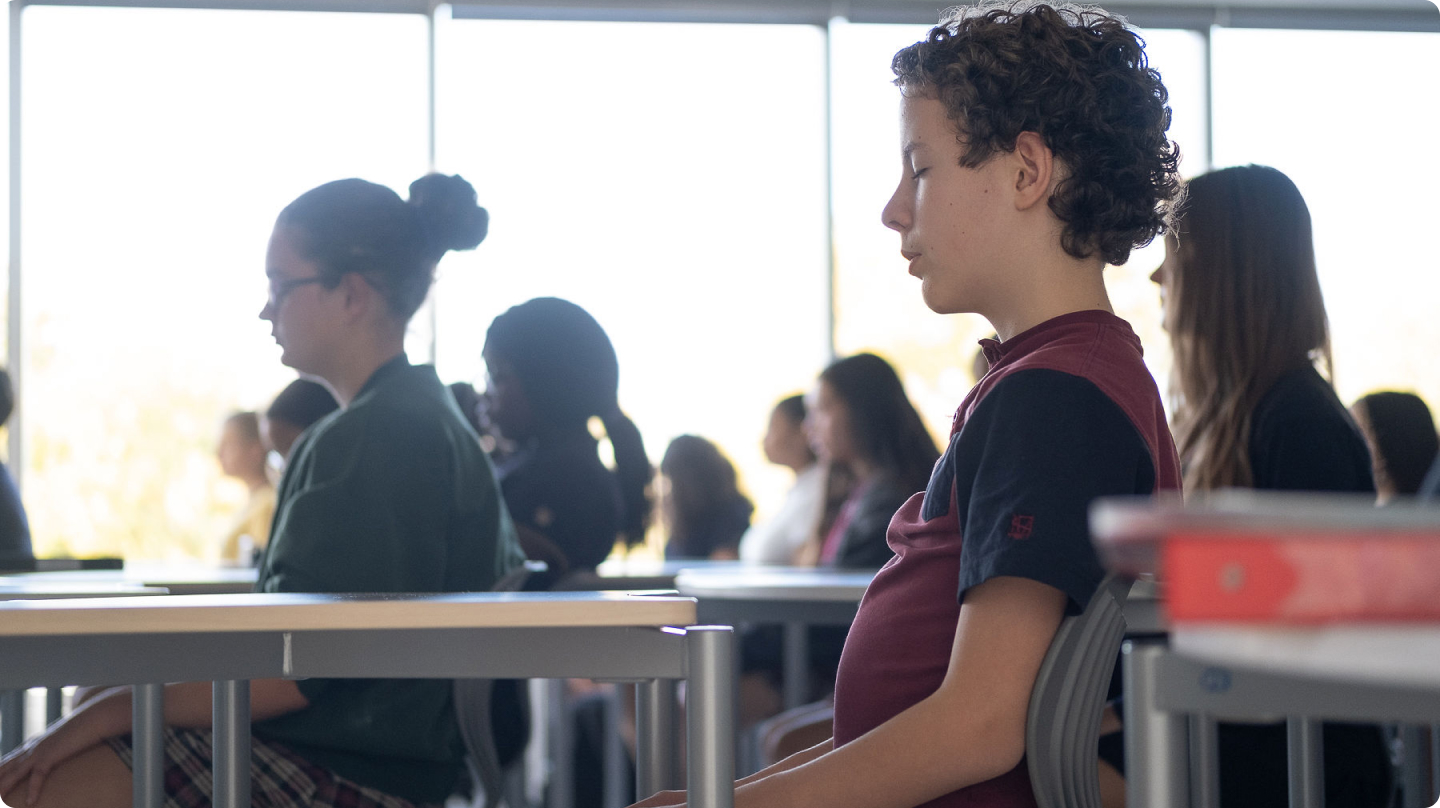Helping teens stay balanced
Meditation, mindfulness, and mentalization: everyday tools for teens
Helping teens stay balanced
Meditation, mindfulness, and mentalization: everyday tools for teens
Authors:
Dr Frédéric Benoit, psychiatrist, and Catherine Malboeuf Hurtubise, PHD, psychologist and teacher
Finding inner calm, taking stock of their emotions, listening to their body and thoughts, and being aware of what others may be thinking can all help teens to nurture their mental health on a daily basis. Below are a few techniques that you can share with your teen and apply in your own life, too.
Mindfulness: a valuable tool🤝 for young people
Practising mindfulness means of focusing wholly on the present moment, on what is going on both inside and outside of yourself. When thoughts and emotions get a bit too heavy, mindfulness techniques can help young people take a break and reflect on the here and now and on their needs.3
Teens can use mindfulness to:
- Handle conflict more effectively
- Stay calm when dealing with complex emotions
- Manage stress on a daily basis,2,4 leaving them better equipped to face life’s challenges
Mindfulness to the rescue at home 🏡
Adopting a daily mindfulness practice at home has a number of benefits for teens:
– It relieves depression and anxiety symptoms.
– It reduces aggressiveness.
– It helps them take on a positive outlook.
– It promotes increased self-awareness and fosters the development of social skills.5
Regular, long-term practice of mindfulness meditation, which stimulates the areas of the brain responsible for thinking and planning, has been proven to have positive, lasting effects on behaviour. Plus, practising mindfulness is an effective way to tackle teen anxiety.
The how-tos of mindfulness meditation
Are you a parent interested in mindfulness meditation? We’ve put together a mini-guide that walks you through how to do mindfulness meditation at home, step by step. You can also listen to podcast episodes on the same topic.
Mini-guide: mindfulness for families
IN THIS MINI-GUIDE, YOU WILL FIND:
- A theoretical section on the origins, benefits, and limitations of meditation
- Advice on starting to meditate as a parent
- Tips on preparing for your first session and meditating with your child
- Some sample meditations to get you started
Listen to our podcast episodes (only available in french for now):
And to increase your odds of getting your teen on board, make sure to read our advice on how to introduce teenagers to meditation and help them reap the full benefits of a good meditation practice.
Learn more
Mentalization: a powerful way to practise self-love and love for others
While mindfulness allows you to observe yourself, mentalization allows you to more effectively observe those around you.
Most of the time, practise mentalization without even knowing it. When we notice an emotion surface, whether in ourselves or from another person, we automatically reflect it in our own behaviour by adjusting our posture, our expression, or our tone of voice.
When we consciously practise mentalization, we give ourselves the opportunity to assess not only what’s on our mind, but what’s on the mind of other people as well. “Why am I thinking and feeling things the way I am? Why is my anger getting the better of me?”
Asking ourselves these questions gives us more context to understand what other people may be thinking and feeling. “They’re not acting like themself today, and they seem to be in a bad mood. What’s going on? Maybe something’s wrong. Did I do something to offend them?”
Essentially, mentalization allows us to be aware of what others may be thinking and feeling and, in doing so, be more conscious of our own thoughts and feelings as well.
How is mentalization useful for teens?
Mentalization allows young people to interact more effectively with others by putting themselves in other people’s shoes. This allows them to:
– Influence others, be influenced in turn, and understand other’s perspectives
– Think before reacting
– Better understand themselves
– Be more tolerant and open

How to apply mentalization to social interactions
For many teens, social interaction can be a source of anxiety or negative thoughts. When the teen in your life is faced with a difficult situation, you can encourage them to reflect on the situation and take a moment to observe the thoughts, feelings, and physical sensations that may come up.
They can ask themselves things like:
• What emotions am I feeling right now?
• How is my body responding to these emotions?
• Why am I reacting this way?
Then, they should consider 🧐 why the other person acted or reacted the way they did and do some detective work 🕵 to think of possible explanations.
MAYBE... MAYBE... MAYBE...
- the other person is going through some hard times themselves
- the other person misinterpreted what I said
- the other person was just tired and grumpy

Then what?
It’s ok if your teen doesn’t have an answer right away. But by getting creative and asking these few simple questions, they’ve already taken a big step toward improving their relationship with the other person. And sometimes, this technique can help them confirm any suspicions they may have had. At the minimum, reflecting on social interactions in this way will help your teen improve their social skills and their understanding of other people.
Need to talk about what you're going through with your teenager?
Contact Tel-jeunes Parents for free professional support, 24/7

Our partner
Les Éditions Midi trente offers practical books and helpful intervention tools aimed at helping people young and old overcome challenges and foster their potential.
References
1. SEMPLE, Randy J., et al. “Mindfulness Goes to School: Things Learned (So Far) from Research and Real-World Experiences”, Psychology in the Schools, vol. 54 (1), 30 Novembre 2016, p. 25. Also available online: https://doi.org/10.1002/pits.21981
2. CARSLEY, Dana, et al. “Effectiveness of Mindfulness Interventions for Mental Health in Schools: A Comprehensive Meta-analysis”, Mindfulness, vol. 9 (3), 23 October 2017, pp. 693–707. Also available online: https://doi.org/10.1007/s12671-017-0839-2
3. CANBY, Nicholas K., et al. “A Brief Mindfulness Intervention for Healthy College Students and Its Effects on Psychological Distress, Self-Control, Meta-Mood, and Subjective Vitality”, Mindfulness, vol. 6 (5), 18 November 2014, pp. 1071–1081. Also available online: https://doi.org/10.1007/s12671-014-0356-5
4. ZENNER, Charlotte, et al. “Mindfulness-Based Interventions in Schools—A Systematic Review and Meta-analysis”, Frontiers in Psychology, vol. 5, 30 June 2014, p. 603. Also available online: https://doi.org/10.3389/fpsyg.2014.00603
5. MALBOEUF-HURTUBISE, Catherine, and Éric Lacourse. Mission méditation : Pour des élèves épanouis, calmes et concentrés, Québec City, Éditions Midi Trente, 2016, 95 pp.

